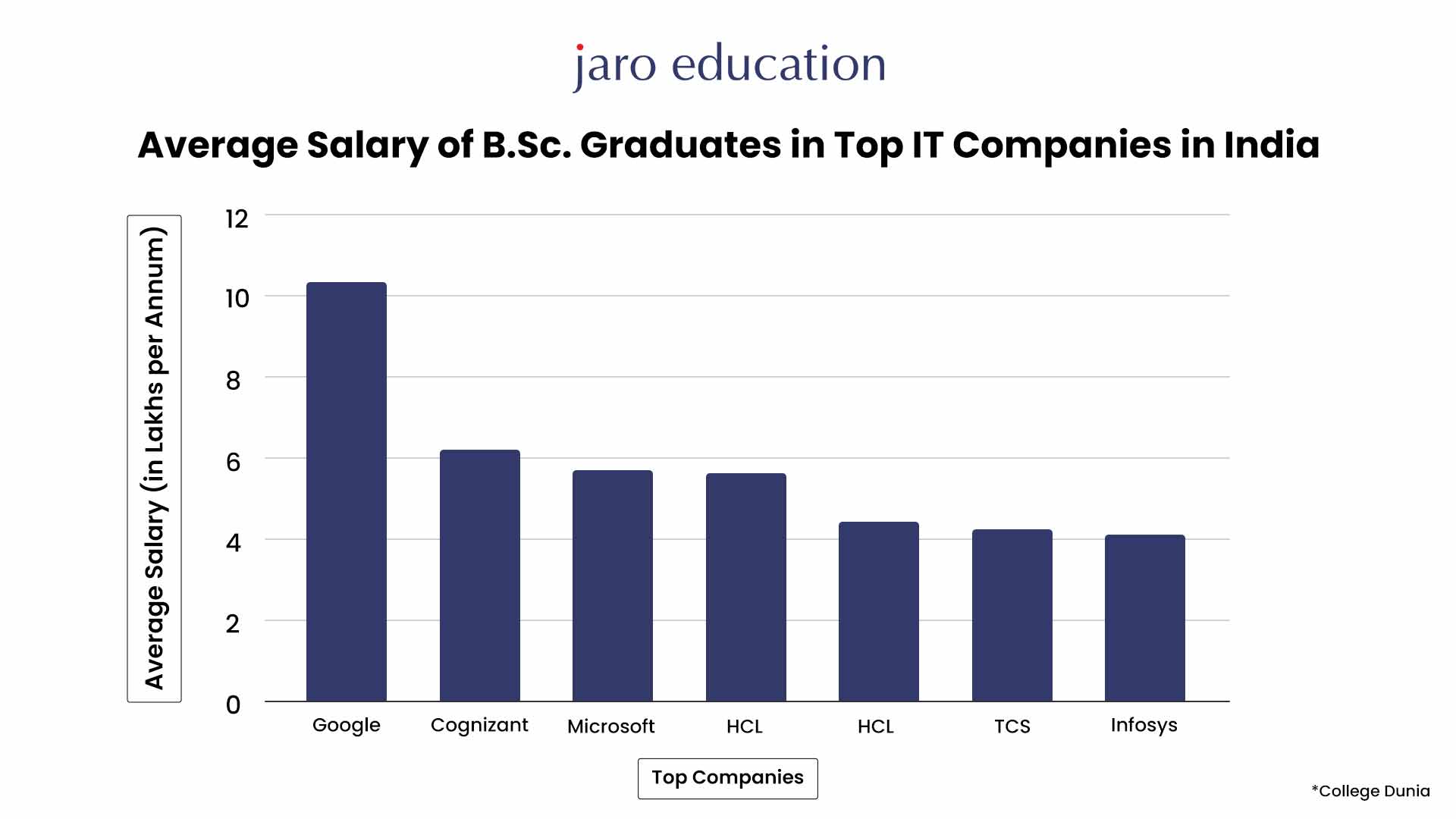Explore Top Career Options for B.Sc. Graduates
Table of Contents

- jaro education
- 21, September 2023
- 3:11 pm
Bachelor of Science (B.Sc.) is a versatile undergraduate degree program which gives students the opportunity to specialize in various fields of science, including Chemistry, Physics, Biology, Mathematics, Computer Science, and more. The B.Sc. degree equips students with a strong foundation in scientific principles, critical thinking, problem-solving skills, and practical laboratory experience. One of the distinct advantages of pursuing a B.Sc. degree is the wide range of career options available upon graduation.
But what are they?
To find out, keep exploring this blog till the end.
About B.Sc. Degree
One of the top undergraduate programs for science students is a B.Sc. or bachelor of science. This field is usually chosen by students who want to pursue jobs in science and technology. The undergraduate B.Sc. program grants a bachelor of science in relevant fields. Students pursuing a B.Sc. have a wide range of options for courses.
Career Opportunities for B.Sc. Graduates
Science is an expansive ocean teeming with possibilities, offering a plethora of avenues for advanced education and career prospects. On the flip side, non-science degree programs encompass a wide spectrum of disciplines that diverge from scientific fields. This encompasses an array of captivating domains such as computer technology, animation, journalism, management, hospitality, as well as law and social work. Here is a list of employment opportunities after B.Sc. courses
| Sectors | Potential Roles |
|---|---|
| Scientific Research and Development | Research Scientist |
| Lab Technician | |
| Data Analyst | |
| Quality Control Analyst | |
| Research Assistant | |
| Healthcare and Medical Fields | Biochemist |
| Healthcare Scientist | |
| Medical Technologist | |
| Nurse | |
| Clinical Research Associate | |
| Information Technology and Computer Science | Software Developer |
| System Analyst | |
| Database Administrator | |
| Network Administrator | |
| Computer Programmer | |
| Environmental and Agriculture Sectors | Ecologist |
| Soil Quality Officer | |
| Land Geomatics Surveyor | |
| Social Forestry Officer | |
| Agricultural Extension Officer | |
| Mathematics and Analytics | Data Analyst |
| Operational Researcher | |
| Statistician | |
| Market Research Analyst | |
| Education and Academia | Teacher or Educator |
| Assistant Professor | |
| Academic Researcher | |
| Educational Consultant | |
| Psychology and Counseling | Counselor |
| Psychiatric Technician | |
| Assistant Clinical Psychologist | |
| Rehabilitation Specialist | |
| Behavioral Health Technician | |
| Nautical and Maritime Industry | Quality Assurance Engineer |
| Marine Surveyor | |
| Operations Director | |
| Ship Captain | |
| Port Manager | |
| Industrial and Production Sectors | Quality Controller |
| Production Chemist | |
| Industrial Technician | |
| Manufacturing Supervisor | |
| Process Analyst | |
| Finance and Business Analytics | Data Analyst |
| Financial Analyst | |
| Business Intelligence Analyst | |
| Risk Analyst | |
| Market Research Analyst | |
| Pharmaceutical and Chemical Industries | Quality Control Analyst |
| Research Scientist | |
| Process Development Chemist | |
| Formulation Scientist | |
| Regulatory Affairs Associate |
Top 10 Career Options After B.Sc.
B.Sc. graduates have a multitude of career options in both the private and public sectors. Depending on their specialization, graduates can find roles in research, analysis, development, education, and more. Some of the prominent Bsc career options include:
1. Research Scientist
B.Sc. graduates can work as research scientists in various scientific fields, conducting experiments, analyzing data, and contributing to advancements in their respective disciplines.
2. Lab Technician
Lab technicians play a crucial role in conducting experiments, maintaining laboratory equipment, and assisting researchers and scientists in their work.
3. Data Analyst
With the rise of data-driven decision-making, B.Sc. graduates can work as data analysts, interpreting and analyzing data to provide insights and inform business strategies.
4. Quality Control Analyst
In industries such as pharmaceuticals, food, and manufacturing, quality control analysts ensure that products meet quality standards through rigorous testing and analysis.
5. Environmental Scientist
Graduates can work in environmental agencies, conducting research to address environmental issues, monitor pollution, and develop strategies for sustainable practices.
6. Science Writer
Those with strong communication skills can pursue a career in science writing, translating complex scientific concepts into accessible content for the general public.
7. Teaching and Education
B.Sc. graduates can become educators, teaching science subjects at schools, colleges, or universities.
8. Medical Representative
Graduates with a science background can work as medical representatives, promoting and selling pharmaceutical products to healthcare professionals.
9. IT/Technical Jobs
With computer science knowledge, graduates can work in IT roles, such as software development, systems analysis, and technical support.
10. Healthcare and Medical Fields
Graduates can work in healthcare settings, such as medical laboratories, clinics, and hospitals, assisting in diagnostics and patient care.
Top Academic Courses To Pursue After B.Sc.
The best courses after B.Sc. are as follows:
1. M.Sc
Pursuing an M.Sc is one of the best career options after B.Sc. It is a logical step for those seeking specialization in areas like Physics, Chemistry, Biology, and Mathematics. This postgraduate degree equips graduates with in-depth knowledge and advanced research skills in their chosen fields. The range of potential career options is vast and includes roles such as:
Professor
Sharing expertise and molding the minds of future generations.
Lab Technician
Contributing to scientific research through hands-on experimentation.
Assistant Professor
Assisting in academic instruction and research endeavors.
Chemical Analyst
Analyzing substances and materials to ensure quality and safety.
Food and Drug Inspector
Ensuring compliance with safety and quality standards in the food and pharmaceutical industries.
Biochemist
Studying the chemical processes within living organisms.
Statistician
Applying mathematical and statistical techniques to analyse data and draw insights.
Mathematician
Solving complex mathematical problems and equations.
Research Scientist
Conducting innovative research to advance scientific knowledge.
Junior Researcher
Assisting senior researchers in various research projects.
2. MBA (Master of Business Administration)
An MBA degree is a hallmark of excellence in business administration. It is among the best courses after graduation in science. This professional degree helps graduates with a wide understanding of different aspects of business management and entrepreneurship. MBA graduates can aspire to a range of high-profile managerial positions, including:
Human Resources Manager
Overseeing workforce management, recruitment, and employee development.
Operations Manager
Managing day-to-day business operations and process efficiency.
Product Manager
Helps in the development and launch of new products or services.
Finance Manager
Managing financial resources and ensuring sound financial decision-making.
Marketing Manager
Strategizing and executing marketing campaigns to promote products or services.
Project Managers
Planning, executing, and closing projects efficiently.
3. MCA (Master of Computer Application)
For those inclined towards the world of computer science, pursuing an MCA course is best option. It offers specialized expertise in fields like Systems Management, Systems Development, and Systems Engineering. This postgraduate program delves deep into various aspects of computer applications. The array of potential job roles for MCA graduates includes:
Computer System Analyst
Evaluating and improving computer systems for organizations.
Technical Consultant
Providing expert advice on technical matters.
Database Administrator
Managing and organizing data in databases.
Hardware Engineer
Designing, developing, and maintaining computer hardware components.
Web Designer or Web Developer
Creating and maintaining visually appealing and functional websites.
Project Manager
Overseeing and coordinating complex technology projects.
Software Developer
Designing, coding, testing, and maintaining software applications.
Software Engineer
Developing software solutions to meet specific needs.
Software Architect and Software Consultant
Designing and consulting on software architecture for complex projects.
4. Data Sciences and Machine Learning
The vast spectrum of Data Science and Machine Learning is experiencing exponential growth and demand. Data Scientists and Machine Learning specialists are sought after for their ability to derive insights and make predictions from large datasets. Pursuing certification programs in Data Science or Machine Learning prepares graduates for roles that involve data analysis, predictive modeling, and innovative problem-solving.
5. B.Ed (Bachelor of Education)
For those with a passion for being academicians, pursuing a B.Ed degree opens doors to becoming a competent educator and mentor. B.Ed programs are designed to enhance teaching skills and pedagogical strategies. Graduates can pursue roles as teachers and professors across various educational institutions. The benefits of a career in teaching include employment security, job satisfaction, competitive compensation, and a flexible schedule.
6. Technical Short-Term Courses
Short-term technical courses offer specialized knowledge and skill development in specific fields. These courses are designed to provide a focused understanding of industry-relevant topics. Some popular short-term courses include:
Post Graduate Diploma in Management (PGDM)
Offering insights into business management and administration.
Business Accounting and Taxation (BAT)
Equipping graduates with knowledge of accounting and taxation practices.
Certified Financial Planner (CFP)
Preparing individuals for careers in financial planning and advisory services.
Data Visualisation
Training in creating meaningful visual representations of data.
Diploma in Digital Marketing and Certificate Program in Data Science
Enhancing skills in digital marketing and data analysis.
7. Management Courses
For those interested in business leadership and innovation, management courses offer valuable knowledge in various areas of business management. These courses enhance business acumen, leadership skills, and strategic thinking. Graduates can explore opportunities in managerial roles across industries.
8. LLM (Master of Laws)
An LLM degree is an advanced qualification for those interested in legal studies. This postgraduate degree allows individuals to specialize in specific areas of law. Career prospects for LLM graduates include roles in legal research, advocacy, legal consulting, and academia.
Career Opportunities After B.Sc.
B.Sc. graduates have a wide array of career opportunities across various sectors. Depending on their specialization, they can choose to work in the following industries:
1. Healthcare and Pharmaceuticals
Graduates can work in medical laboratories, pharmaceutical companies, and healthcare institutions, contributing to research and diagnostics.
2. Information Technology
With programming and computer science skills, graduates can pursue roles in software development, data analysis, and IT consulting.
3. Education
B.Sc. graduates can become educators at schools, colleges, and universities, sharing their knowledge with the next generation.
4. Environmental Sciences
Those passionate about the environment can work in environmental agencies, conducting research on pollution, conservation, and sustainability.
5. Research and Development
Graduates can work in research and development roles across various industries, contributing to advancements in technology and science.
6. Agriculture and Food Industry
Graduates can work in agricultural research, food safety, and the development of sustainable farming practices.
7. Quality Control and Testing
Industries such as manufacturing and pharmaceuticals require quality control analysts to ensure products meet high standards.
8. Data Analysis and Analytics
Graduates with a knack for data analysis can work in roles that involve interpreting and deriving insights from large datasets.
9. Biotechnology and Pharmaceuticals
Graduates can work in biotech firms, pharmaceutical companies, and research institutions, contributing to advancements in healthcare.
10. Environmental Consulting
Graduates can work as environmental consultants, advising businesses and organizations on sustainable practices and compliance.
Job Opportunities After B.Sc.
B.Sc. graduates enjoy diverse job prospects tailored to their specialized domains. Opportunities range from research scientists at the forefront of groundbreaking experiments and data interpretation to lab technicians facilitating research projects. Graduates can also become data analysts, unravel valuable insights, or quality control analysts, safeguarding product quality. Environmental scientists are pivotal in tackling sustainability issues, while science writing offers a pathway to conveying complex ideas to wider audiences; for those inclined towards education, teaching and educational roles await alongside careers in medical representation and IT professions encompassing software development and technical support. Moreover, the healthcare sector welcomes B.Sc. graduates in roles contributing to diagnostics and patient care.

*collegedunia.com
Top Job Profiles and Average Pay Packages According to B.Sc. Specialisations
Graduates with B.Sc. and M.Sc degrees often have a competitive advantage in job applications. Here are some of the top job profiles within various B.Sc. specializations, along with their respective average annual salaries:
| Career Options | Approx Salary (INR) |
|---|---|
| Physicist Radiologist Assistant Data Scientisters | 9.18 LPA |
| Quality Controller Laboratory Technician Production Chemist | 6.76 LPA |
| Molecular Biologist Ecologist Botanist | 7.16 LPA |
| Operational Researcher Data Analyst Research Scientist | 8.06 LPA |
| System Analyst Database Administrator Software Engineer | 7.30 LPA |
| Industrial Nurse Military Nurse Nursing Executive | 3.03 LPA |
| Soil Quality Officer Social Forestry Officer Land Geomatics Surveyor | 7.21 LPA |
| Psychiatrist Counsellor Assistant Clinical Psychologist | 4.15 LPA |
| Quality Assurance Engineer Building and Faculty Manager Operations Director | 4.20 LPA |
| Hardware and Network Expert Programmer Computer Support Specialist | 6.03 LPA |
Please note that the salary figures are provided in INR (Indian Rupees) and are approximate values.
These are just a few examples of the diverse job profiles available to graduates with B.Sc degrees in various specializations. The average pay packages can vary based on factors such as the area of studies, experience, location, and the specific employer. It’s important for graduates to explore their interests and strengths to find the best-fit job profiles within their chosen field.
Takeaway
A B.Sc. degree opens the door to a plethora of exciting career opportunities across various industries. Graduates can choose to specialize further by pursuing postgraduate studies, professional courses, or entering the job market directly. B.Sc. graduates are in a good position to contribute to creative ideas, research breakthroughs, and societal growth, given the swift advancements in science and technology. Whether it’s pursuing higher education or stepping into the workforce, B.Sc. graduates are equipped to make a notable impact in their chosen fields.
FAQs
B.Sc. graduates have a wide range of career opportunities, including roles as research scientists, lab technicians, data analysts, quality control analysts, environmental scientists, science writers, educators, IT professionals, and more.
Yes, pursuing higher education is a popular choice for B.Sc. graduates. They can opt for master’s degrees (M.Sc), MBA, MCA, or specialized postgraduate diplomas in fields related to their B.Sc. specialization.
Pursuing an M.Sc after B.Sc. allows graduates to specialize in a specific field, deepen their knowledge, and enhance their career prospects. It opens up opportunities for advanced research and specialized roles.
An MBA can equip B.Sc. graduates with managerial skills, making them suitable for leadership positions in various industries. Specialized MBA tracks, such as Healthcare Management or Data Science, combine scientific knowledge with management expertise.
Yes, B.Sc. graduates with computer science knowledge can find job opportunities in the IT sector. Roles such as software developers, data analysts, system administrators, and IT consultants are available.
Absolutely. B.Sc. graduates can work in healthcare settings such as medical laboratories, clinics, hospitals, and pharmaceutical companies. They can contribute to diagnostics, patient care, and medical research.
Yes, B.Sc. graduates can work as environmental scientists, addressing environmental issues, conducting research on sustainability, and developing strategies for conservation and sustainable practices.
Yes, B.Sc. graduates interested in teaching can pursue a Bachelor of Education (B.Ed) degree and become educators at schools, colleges, and universities.













